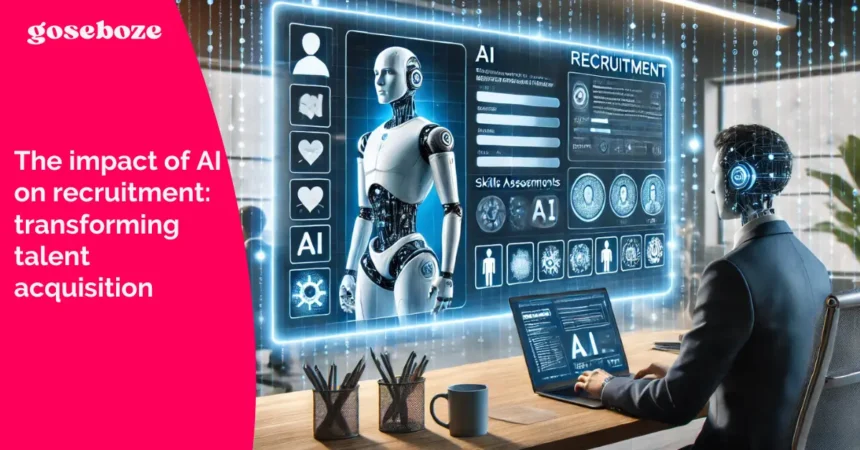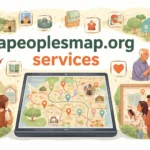For recruiters, this shift brings both exciting opportunities and significant challenges. As businesses continue to adopt AI-driven solutions, talent acquisition platforms and staffing software are becoming more sophisticated, enabling faster, more efficient hiring processes.
This article explores how AI is reshaping recruitment, the ways in which AI-powered tools are enhancing the recruitment journey, and how recruiters can leverage these technologies to stay ahead of the curve.
AI in recruitment
Artificial intelligence (AI) has had a profound impact across industries, and recruitment is no exception. Traditionally, recruitment has been a time-consuming, manual process, involving tasks such as sifting through resumes, scheduling interviews, and conducting initial candidate assessments. These tasks are often repetitive and mundane, leaving room for human error and bias.
AI technology, however, is revolutionizing how recruitment teams approach these tasks. With the ability to process vast amounts of data quickly and efficiently, AI tools are able to assist with tasks that were once time-consuming and prone to human error.
For instance, AI algorithms can now analyze resumes and job applications with remarkable speed and accuracy. By scanning for relevant keywords, skills, and qualifications, AI-powered recruitment software can automatically shortlist candidates, allowing recruiters to focus their attention on those most likely to succeed in the role.
Talent acquisition platforms: A more strategic approach
Predictive analytics, for example, allows recruiters to identify the likelihood of a candidate’s success within an organization based on historical data. By analyzing past hiring patterns, job performance, and employee retention rates, AI can make data-driven recommendations that enhance the decision-making process. This results in a more strategic approach to hiring, where recruiters are empowered to assess candidates beyond their resumes and qualifications.
Moreover, AI-driven talent acquisition platforms enable recruiters to build extensive talent pools. By leveraging machine learning algorithms, these platforms can scan databases of candidates and automatically match them with job openings, streamlining the recruitment process.
Recruiters can then focus on building relationships with top-tier talent, creating long-term pipelines for future hiring needs.
The integration of AI into talent acquisition platforms allows companies to move away from reactive hiring strategies and adopt more proactive ones.
AI and the candidate experience: Streamlining communication
The candidate experience is a critical aspect of recruitment that can make or break an employer’s brand. Negative candidate experiences can lead to poor reviews on job boards, damaging the company’s reputation and deterring top talent. As a result, improving candidate engagement and communication is essential for successful recruitment.
AI-powered tools are helping recruiters enhance candidate experiences by providing more timely and personalized communication.
For example, chatbots powered by AI can interact with candidates in real-time, answering questions about job openings, providing status updates on applications, and scheduling interviews. This immediate feedback loop ensures that candidates feel valued throughout the hiring process, which ultimately contributes to a more positive experience.
The best staffing software: AI-enhanced features
Staffing software has always been a cornerstone of recruitment operations, helping teams manage job postings, track candidates, and streamline workflows. However, as recruitment teams face increasing pressure to find top talent quickly, the best staffing software now incorporates AI to meet these demands.
One of the most valuable features of AI-enhanced staffing software is automated candidate matching. By scanning through job descriptions and resumes, AI can recommend candidates who best fit the role’s requirements, significantly reducing the time spent on manual screening.
This feature not only speeds up the hiring process but also increases the likelihood of finding the right candidate.
This allows recruiters to gain insights into a candidate’s personality and communication skills before meeting them in person, further streamlining the hiring process.
By integrating AI into staffing software, companies are gaining a competitive edge in the talent acquisition space. These tools help recruiters make faster, more accurate hiring decisions, ultimately leading to better outcomes for both the company and the candidates.
Mitigating bias with AI: The ethical side of recruitment
One of the key concerns with AI in recruitment is the potential for bias. AI algorithms are trained on historical data, which may contain inherent biases based on gender, race, or socioeconomic status. If not properly managed, AI could perpetuate these biases, resulting in unfair hiring practices.
However, AI also has the potential to mitigate bias in recruitment if designed and implemented correctly.
For instance, AI-powered recruitment tools can be programmed to focus solely on candidates’ qualifications, skills, and experience, removing personal information that could lead to biased decision-making. By filtering out factors like name, gender, or age, AI can ensure that candidates are assessed based on their merits alone.
Challenges and limitations of AI in recruitment
While AI presents many opportunities for enhancing recruitment practices, it is important to recognize its limitations. AI tools are not infallible and should not be seen as a replacement for human judgment. Instead, AI should be viewed as a valuable tool that complements the expertise and intuition of recruiters.
For example, while AI can help automate tasks such as resume screening and candidate matching, it cannot replace the human element in assessing cultural fit, soft skills, or overall alignment with the company’s values. These aspects of recruitment require human insight and judgment, which AI alone cannot replicate.
The future of AI in recruitment
As AI continues to evolve, its impact on recruitment will only grow. With advancements in machine learning, natural language processing, and predictive analytics, AI is poised to play an even greater role in shaping the future of talent acquisition. In the coming years, we can expect AI to become more advanced, more intuitive, and more seamlessly integrated into the recruitment process.
For recruiters, the key to success will be learning to leverage AI in ways that complement their skills and expertise. By embracing AI-powered tools and integrating them into their recruitment strategies, recruiters can enhance their efficiency, reduce biases, and ultimately hire better talent faster.
Conclusion
AI is undoubtedly transforming the way recruitment is conducted, offering enhanced capabilities for talent acquisition, candidate engagement, and staffing management. From AI-driven talent acquisition platforms to advanced staffing software, the opportunities to improve recruitment practices are vast. While challenges remain, particularly around bias and cost, the potential benefits of AI in recruitment far outweigh the drawbacks.
As the recruitment industry continues to embrace these technological advancements, companies that integrate AI into their hiring processes will be better positioned to attract top talent, reduce hiring timelines, and create a more positive candidate experience.
Subscribe to the best recruitment newsletter and get the latest insights, trends, and tips to stay ahead in the industry. Become the smartest recruiter in the room today!








